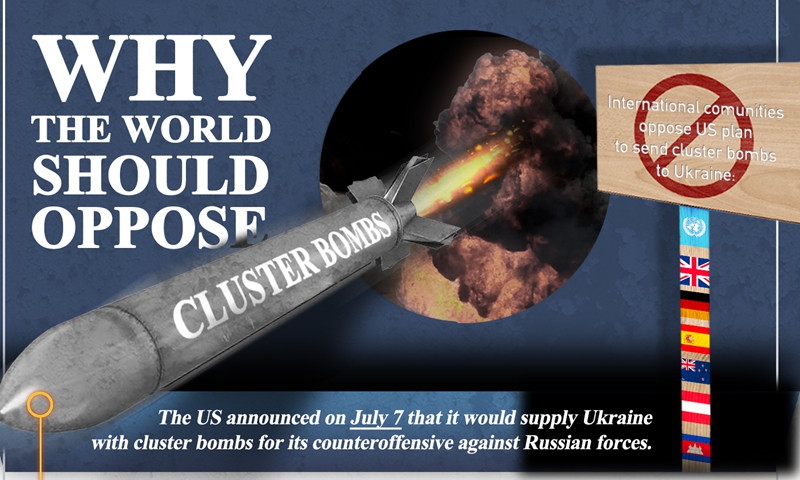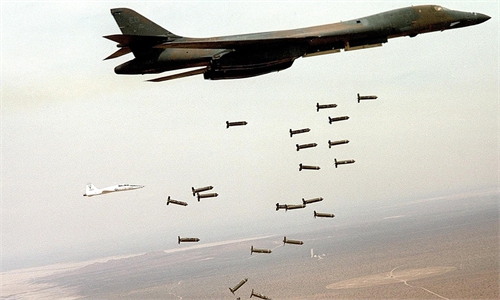IN-DEPTH / IN-DEPTH
US veteran in Vietnam War regrets dropping cluster bombs

Why the world should oppose cluster munitions? Graphic: Xu Zihe/GT
During the Vietnam War, the US used cluster bombs to carry out airstrikes on targets in Vietnam, Laos, and Cambodia. Between 1964 and 1973, 260 million tons of cluster bombs were dropped on Laos, particularly in the Xieng Khouang Province in northeastern Laos, of which 80 million tons failed to detonate. In Quang Tri Province in Vietnam alone, some 7,000 people were injured or killed by cluster bombs left over from the Vietnam War as of 2009.Retired US Air Force officer Mike Burton, the board chairman of Legacies of War, an organization that raises awareness about the history of the bombing of Laos during the Vietnam War, now chairs the US Campaign to Ban Landmines & Cluster Munitions Coalition.
In April, Burton expressed regret at dropping cluster bombs on Laos in the US' "secret war" in an opinion piece published on USA Today, warning that "Ukraine shouldn't want this nightmare."
"All that was accomplished by using these inhumane weapons was to leave a trail of destruction that remains to this day, and a deep sense of regret for US veterans like myself," stated Burton in the piece.
Burton joined the US Air Force in 1962 and spent the early part of his military career in special operations. He was assigned to the 56th Air Commando Wing in Nakhon Phanom, Thailand, in 1966. "The primary mission of the units to which I was assigned was to stop the flow of personnel and materials coming from North Vietnam through the Ho Chi Minh Trail to South Vietnam. The trail was located almost entirely in Laos," he explained. "Despite the 2.5 million tons of ordnance that the US dropped from 1964 to 1973, it did nothing to impede traffic along the Ho Chi Minh Trail."
"I saw this destruction firsthand from the air and on the ground. I have seen Lao children and adults with missing limbs, eyes, and mutilated faces all from unexploded ordnance. The impact of our decision to drop cluster bombs on Laos also found its way to the US with waves of refugees fleeing death," he noted.
Burton regrets what he did during the Vietnam War, and hopes that similar tragedies will never happen again in the future.
Burton later took part in the detonation of some of the unexploded ordnances - work that is tedious, time consuming, and extremely dangerous. "It's done in some of the most vulnerable areas where families are only a few steps away" as he said.
During the Vietnam War, the US dropped millions of tons of bombs on Vietnam, Laos, and Cambodia, including large amounts of cluster munitions, burying the region in unexploded ordnance (UXOs). UXOs still kill or maim dozens of people each year in nations such as Vietnam, Laos, and Cambodia. Thousands have died or have been seriously maimed since the US-led war ended in 1975.
UXOs have also proven to be an obstacle to regional development. For example, when China constructed Laos' first high-speed rail line, connecting China's southern city of Kunming to Laos' capital in Vientiane on the border with Thailand, engineers were initially required to clear the railway path of US-dropped UXOs, including cluster munitions.
Burton believes that the US supply of cluster bombs to Ukraine would have catastrophic consequences that would haunt Americans and Ukrainians for decades, saying that he doesn't "want it to happen again."

